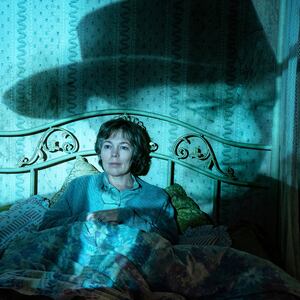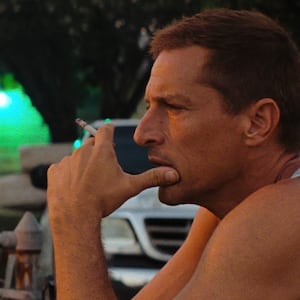When she first started reading Elena Ferrante’s books, Maggie Gyllenhaal was startled to discover how visceral, extreme, and, it turns out, polarized her reaction was to the Italian author’s writing.
It’s when she got to book three of Ferrante’s massively popular Neapolitan Novels, which kicked off in 2012 with My Brilliant Friend, that Gyllenhaal paused to take stock of herself and what she was feeling. “At one point, I was like, ‘Oh my God, this woman is so fucked up,’” the actress tells The Daily Beast. “And then literally 10 seconds later, I thought, ‘Oh, no, I actually really relate to her…’” That reaction only raised more questions: “And so am I fucked up? Or is this some kind of common experience that we're all having and just haven't been talking about? Which is actually very comforting.”
Gyllenhaal is currently on the awards circuit, which has doubled as a chance to really sit with and interrogate what has become an intimate connection to the work of Ferrante, who famously goes by a pseudonym and whose identity has, speculation aside, remained a secret since her first novel was published in 1992.
The Oscar-nominated actress, who has earned a reputation and appreciation for playing complicated and sometimes thorny women on screen, is taking that approach behind the camera, making her directorial debut with The Lost Daughter, which she also wrote the screenplay for, based on Ferrante’s 2006 work.
The film, which hits theaters Friday before streaming on Netflix on Dec. 31, premiered in September at the Venice Film Festival: a splashy launching pad for projects with their eyes set on the Oscars. Gyllenhaal won the award for Best Screenplay, the first of a haul of trophies and nominations she and the film have picked up since.
In November, Gyllenhaal won three categories, including Best Feature, at the Gotham Independent Film Awards, while star Olivia Colman took home Outstanding Lead Performance and Jessie Buckley competed for Outstanding Supporting Performance. The Lost Daughter received four nominations this week from the Independent Spirit Awards, as well as two each from the Golden Globes and Critics Choice Awards. Colman is considered a shoo-in for a Best Actress nomination at the Oscars.
In the film, Colman plays Leda, a British academic on holiday in Greece who strikes up an enigmatic relationship with a young mother (Dakota Johnson), the two sussing each other out while bonding over the struggle of maintaining one’s own worth while raising a child. Buckley plays Leda in flashbacks to a time when, as a young mother herself, her career was taking off and she made a drastic decision when it came to her kids—one that many mothers wouldn’t be able to understand. Or maybe they would understand perfectly… and maybe that, too, would scare them.
The danger of those kinds of thoughts and feelings is precisely what thrilled Gyllenhaal.
“I felt like [Ferrante] was saying things out loud that I had never heard articulated out loud before, in particular about a feminine experience in the world,” she says. “I think there’s an agreement that we’ve all made not to talk about some of these experiences. And I think she broke the agreement. It was really thrilling and dangerous and exciting.”
Gyllenhaal knew that Ferrante’s novels were flying off the shelves, so she suspected she wasn’t alone in her fascination with those feelings.
“What would it feel like to have this actually said out loud, to have some of these things?” she says. “The thing about a film is it’s both personal and communal at the same time. What if you were hearing these dangerous, truthful things said out loud while sitting next to your husband or your mother or your daughter? That seemed to me like a radical thing to consider and try to do.”
While Gyllenhaal has gotten into producing in recent years, taking on that role with 2018’s The Kindergarten Teacher and the HBO series The Deuce, both of which she also starred in, she had never written a screenplay or directed before. She wrote to Ferrante herself to ask if she could adapt The Lost Daughter into a film. Ferrante said yes, but only on the condition that the actress direct the project as well—a vote of confidence that Gyllenhaal didn’t know she needed.

The novelist even wrote a piece for The Guardian endorsing Gyllenhaal as the film’s writer and director, saying, “Another woman has found in that text good reason to test her creative capacities. Gyllenhaal has decided, that is, to give cinematic form not to my experience of the world but to hers, starting from The Lost Daughter. It’s important for me—for her, for all women—that her work be hers and turn out well.”
All of Gyllenhaal’s interactions with Ferrante were over email and, as always, with the author remaining anonymous. “It meant that she could continue to be, all the way through the process for me, this kind of cosmic, feminine, supportive force out there in the world,” she says. “And that could look like however I needed it to look.”
Originally, the project was going to be set in the U.S. instead of the novel’s Italy and was set to shoot in New Jersey in July 2020. When COVID hit, Gyllenhaal had the idea of moving production to Greece, where a middle-aged British academic would believably vacation alone. The country’s low COVID rates meant that the cast and crew were able to travel there in mid-August for the month-long shoot.
As for her approach, Gyllenhaal wanted the movie to have elements of thriller and even horror genres in it. But she also wanted viewers to feel a certain warmth and ease while watching: “I wanted to create an environment for the audience that was loving, so that you could be brave enough, hopefully, to consider the ways in which you empathize with this woman who’s doing these very transgressive and aberrant things. That was the same environment I wanted to create for everybody on my set. A loving, safe environment where they were actually loved, so that they felt safe enough and brave enough to get into some kind of dangerous waters.”
While The Lost Daughter has played at screenings throughout the fall and Gyllenhaal has been able to participate in audience Q&As and speak with people after they’ve watched the film, she’s been struck by how personally and passionately women, especially, have internalized it. There’s an honesty to Leda’s decisions and the things she says about motherhood that makes people react intensely. It can be painful and infuriating. Or it can be cathartic, making you feel less alone.
“I think that people have felt comforted in the way that I felt comforted reading Ferrante,” she says. “Like, ‘Yeah, this is painful. Yeah, this is dark. Yeah, I would like to push this away from my experience.’ And yet, there's also something really comforting about seeing other people—not only this character in this movie, who we don't indict, but all the filmmakers and the actors—acknowledging that we can relate to her. So it's OK if you also relate to her.”
Now that people are really starting to see and react to the movie, Gyllenhaal has begun to reflect on her experience as a first-time director and the approach she took to making The Lost Daughter. When she conceived the movie, she married herself to the idea of a classic thriller format. As an actress, she knew that when there’s a clear and familiar structure, “an audience can relax and say, ‘OK, I understand the language of this movie,’” she says. “It makes space for much wilder, stranger expression, because you can hang your hat on that structure.”
But three weeks after she finished the mix on The Lost Daughter, she went to the Cannes Film Festival, where she was blown away by seeing films in which all the conventions she thought she needed to confine herself to were exploded by the filmmakers whose work she was adjudicating in ways that challenged and thrilled her. That made her excited about the future.
“I'm curious what the language of my next film will be,” she says. “Because I think I didn’t know that I could be totally free.”








